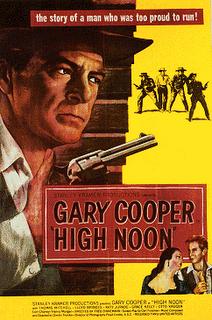 High Noon:
High Noon:Follow Up on "A Better Life"
A previous post on 1-7-07 prompted some interesting comments and questions from Obsession. As that cautionary film's disclaimer says, the radical Muslims are a minority and vastly outnumbered by those who would prefer to live in peace. Unfortunately, we know from 9-11 that terrorists are willing to borrow the freedom they hate in order to make a statement against it. This makes life more difficult for non-militant Muslims who choose to practice their faith in non-Muslim countries.
I'm writing this on Martin Luther King Jr. Monday. This weekend, I've heard many references to King's "I Have a Dream" speech. This is interesting in light of a BBC documentary I watched last week called "The Power Of Nightmares" By Adam Curtis. (It's on Google Video here. It's in 3 one-hour parts but worth the time.) The premise (though perhaps a generalization) is that political leaders have lost the ability to cast dreams and have resorted to leading through fear.
“In a society that believes in nothing, fear becomes the only agenda. While the 20th Century was dominated by a conflict between a free-market right and a Socialist left….at least they believed in something. Whereas, what we are seeing now [post Cold War] is a society that believes in nothing [and is therefore] particularly frightened by people who believe in anything….” (from The Power of Nightmares, Part III)
There is useful information in Curtis' presentation, but I disagree with his premise and many of his conclusions—especially that the fear of global terrorism stems from fear of a misunderstood religion in general. I think it comes more precisely from an understood fear of random death. His treatise (Part I) did, however, help me better understand the long and ironic "prologue" of what some call Jihad and why much of Europe and the Arab world is afraid to speak out against the radicalism behind it.
He also points out that Jihadists who oppose the West (including Westernized Muslim nations) do so because freedom leads to individualism, materialism, and selfish, vulgar living.
In my February 19, 2006 post I said...
"I believe we are on the right side in the War on Terrorism, but this conclusion is not based on our 'goodness' as a nation or our 'fitness' to export freedom [if such were possibe]. Unfortunately, from a moral perspective, it's harder to make a case for democracy's contrast to tyranny if that democracy is linked to moral decay. (e.g. Which is worse: a woman’s choice to be dressed in veils or her willingness to be undressed in vile men's entertainment?)
The cause is indeed complicated by a caricature of Western democracies reveling in unfettered 'freedom' which values the right to have choices more than the responsibility of choosing wisely.... [Curtis would say "there's the rub," and it's why Americans must better model the values promoted at TFFABL.] Freedom itself must be restricted (else why the need for STOP signs?)....That is the cause of the constant tension between freedom and self-governance....Even so, I believe that on our worst day, our system of government—not our moral example—reflects more of our Creator's ideals than tyrannical systems of fear."
I would suggest that the poor moral example set by the West is a result of man's depravity not his freedom. It is my personal belief that the values at the heart of a better life were established by God and cannot be maintained while rejecting Him. The fear of the Lord is the beginning of wisdom for those who understand His gospel, but this understanding cannot be forced upon anyone. That mistake has been made by many religions—including Christianity—through the centuries.
As in the 7th's post, I can't say that either side is fighting "for God," but I will say a better life or a bitter life depends on victory over terrorism because fear of the unknown brings out the worst in mankind.
Iraq is the current focal point of this clash of ideals. The goal is victory not peace. As outsiders, the Coalition cannot hope to settle the ancient civil wars in that region. (We didn't start and cannot finish those.) On the other hand, it must give the new Iraqi government a fighting chance against the insurgents who wish it to fail. Everyone wants the war to be over, but most agree that we cannot simply cut and run.
This war has resembled High Noon from the start. (Rent it and see if you agree.) But the role of sheriff must change to the Iraqi people and its leaders. The insurgents may hate the West, and the Iraqi people do not need to be Westernized, but they must understand the courage of that Western when it comes time for the Coalition Forces to withdraw. For all the obvious reasons outsiders cannot remain indefinitely as the sheriff. Self-government must ultimately be self-maintained. [As seen in this June 2007 update.]
.
Because the intent of this follow up was to clarify these thoughts--not to initiate or prolong this topic on my blog--I have chosen to close comments on this post for the time being. Thank you.
T.K.



